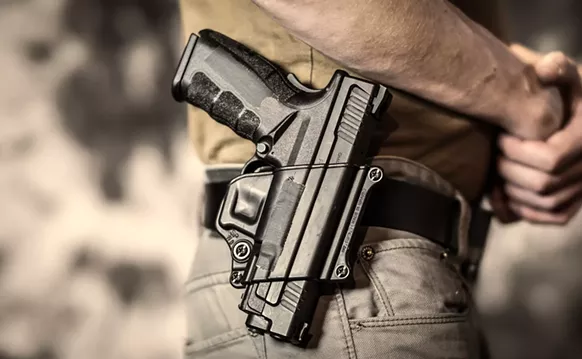This is the second post in a two-part series about the BSO's fondness for TV cameras.
On February 1, 2011, two bald, white Broward Sheriff's deputies were talking to Devin Matthews, a 32-year-old black man, as he stood on his front yard. Detective Andrea Penoyer, a beautiful blond woman in tactical armor, strode over to meet them. As she arrived, one of the deputies suddenly reached behind Matthews' shoulders and tried to shove him down to the ground. Matthews resisted and stood up. Penoyer ran over and shouted, "He just threw --" and grabbed his right arm. She and another deputy pulled his arms out as the third deputy stood behind him and fired his Taser. Once Matthews was on the ground on his stomach, they ran a couple of audible jolts through him.
Once Matthews was subdued on the ground, saying he hadn't done anything wrong by standing in his yard, Penoyer stood over him and plucked the cigarette pack from his pocket. She told him he had been distracting the cops from arresting his neighbor on drug charges. "When we tell you to do something, do it right away," she said. "Don't argue with us."
This was all being filmed for an episode of Police Women of Broward County, the controversial TLC show that follows Penoyer and other lady deputies on the line of duty. The thing is: Intentionally or not, the deputy's first shove to subdue Matthews was timed perfectly to coincide with the arrival of Penoyer and the television cameras.
Were it not for the cameras, we wouldn't know that: Very little of this scene made it into the police report. The deputies wrote up Matthews for resisting arrest both with and without violence and noted in the report that he had his fists clenched and was about to swing at one of them. Few of the above details of the scene were reported. The arrest was never edited to go on the air.
Instead, it occupies the gray area of police-show outtakes: Is it admissible as evidence? Is it strictly entertainment, with no legal weight? And who's going to notice if it shows something different from what's on the arrest report?
Gordon Weekes, an assistant public defender in Broward County, has been requesting and reviewing footage like this for more than a dozen cases that have come through his office.
He hasn't found any smoking guns -- no cameramen getting in the way of the line of duty, no coercions to sign confessions or anything like that -- but he's looking for discrepancies between what actually happened and how the police reported it. This puts him and other defense lawyers in a strange situation: They object vociferously to shows like Police Women, saying they encourage deputies to act recklessly and sensationalize arrests, since they're paid by the TV producers as well as the sheriff's office. But the best weapon for proving that point may be the video itself.
Weekes, a soft-spoken black attorney with hair pulled back in long dreadlocks, was in court on September 27 for his client, a young boy who had been arrested for allegedly stealing cigarettes and a lighter. The arrest had been filmed for Cops, which started in Broward County and returned earlier this year to film another season.
"After reviewing the discovery and looking at all reports submitted by the state, there's no reference to any television show, recording devices, or any video taping," Weekes told the court. "We are seeking for the court to order the state to produce the unedited video footage."
Weekes didn't know what he would find, but it was worth a look. In particular, he wanted to see if cameras recorded the "show-up," in which the victim identified his client as the thief who had run away. "That would be very, very relevant to this case," he said.
But BSO's lawyer said the agency couldn't release the tapes because it didn't have them. "This is proprietary, copyright material that the sheriff's office does not own," said attorney Mila Schwartzreich. As far as BSO is concerned, the cameras shouldn't affect the outcome of a case, because producers are simply along for the ride while officers do their jobs.
But Weekes doesn't think it's that simple. He noted that BSO's contract with the producers of Cops gives it the right to review all footage before it goes to air. Furthermore, he said, the TV people are essentially working as "agents" of law enforcement, through the contract. So why shouldn't the Sheriff's Office be held responsible for evidence on tape?
The judge, Elijah Williams, raised a different point. "If [the defendant] did something dumb and shot an officer... that tape would be in your office already," he told the BSO lawyer. If the video brought in that type of strong new evidence against a client, law enforcement and the state attorney would doubtless want to see it. "The sheriff enters into a contract with a guy with camera so the guy with the camera can follow him around and show the deputy in a good light..." But what if it shows him in a bad light? "At that point in time, we can't see that, but we should show the good stuff?"
Williams agreed to write a short order instructing BSO to turn over the footage. But the issue is still murky legal territory.
In another case, Weekes believes a suspect may have been coerced into confessing -- and signing a TV waiver -- during a moment when cameras were off. And questionable cases keep piling up.
-- When the mother of a juvenile offender who had thrown another boy into a canal was brought into questioning, she looked toward the camera and was giddy about being on television.
-- When a Haitian family got into a domestic dispute, Police Woman Erika Huerta spent the good part of an hour talking to the family and securing footage of herself playing a sober, big-sister role to the defendant before carting her off to jail as a wholesome lesson. Meanwhile, the defendant's sister giggled about being on TV.
-- In 2006, the mother of a West Palm Beach man sued the Palm Beach sheriff, claiming that her son had died while being subdued by deputies as well as cameramen for an episode of Cops.
-- And currently, there's a federal-court case dragging through court in which the defendant, Jerry Byrd, is suing BSO from jail for a prostitution-sting arrest conducted by Huerta at the Relax Inn Motel in Pompano Beach. His case is riddled with errors and his claim appears muddled, but the case has dragged on for months. In this instance, BSO is being represented by an outside attorney -- paid for by the producers of Police Women, as stipulated in their contract.
Back at Devin Matthews' front yard, deputies found a clump of what looked like pot and said it belonged to Matthews. "I didn't have nothing in my hand; now you're trying to give me another charge," Matthews protested.
"Don't worry, it's on camera," said Penoyer.
"That's right, it's on camera," said Matthews, hobbled on the ground. "I ain't got nothin' on me, ma'am... You come in my yard. I guess the camera seen that too."
Follow @NewTimesBroward












